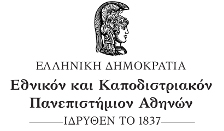Menu
- ΑΝΑΚΟΙΝΩΣΕΙΣ ΚΑΙ ΕΚΔΗΛΩΣΕΙΣ
- ΠΡΟΗΓΟΥΜΕΝΗ ΙΣΤΟΣΕΛΙΔΑ
- ΤΟ ΤΜΗΜΑ
- ΕΠΙΚΟΙΝΩΝΙΑ ΜΕ ΤΗ ΓΡΑΜΜΑΤΕΙΑ
- ΕΓΚΑΤΑΣΤΑΣΕΙΣ ΚΑΙ ΠΡΟΣΒΑΣΗ
- ΤΟΜΕΙΣ
- ΠΡΟΠΤΥΧΙΑΚΕΣ ΣΠΟΥΔΕΣ
-
ΜΕΤΑΠΤΥΧΙΑΚΕΣ ΣΠΟΥΔΕΣ
- ΑΡΕΘΑΣ
- ΓΛΩΣΣΟΛΟΓΙΑ
- ΔΕΞΙΠΠΟΣ
- ΚΟΡΑΗΣ
- ΛΑΪΚΟΣ ΠΟΛΙΤΙΣΜΟΣ ΚΑΙ ΛΟΓΟΤΕΧΝΙΑ-ΓΕΩΡΓΙΟΣ Α. ΜΕΓΑΣ
- ΛΟΓΟΤΕΧΝΙΑ, ΣΚΕΨΗ ΚΑΙ ΠΟΛΙΤΙΣΜΟΣ ΣΤΟΝ ΕΛΛΗΝΟΡΩΜΑΪΚΟ ΚΟΣΜΟ
- ΠΑΠΥΡΟΛΟΓΙΑ ΚΑΙ ΚΛΑΣΙΚΗ ΓΡΑΜΜΑΤΕΙΑ
- ΔΙΑΤΜΗΜΑΤΙΚΟ ΠΜΣ ΓΝΩΣΙΑΚΗ ΕΠΙΣΤΗΜΗ
- ΔΙΑΤΜΗΜΑΤΙΚΟ ΠΜΣ ΜΕΤΑΦΡΑΣΗ: ΕΛΛΗΝΙΚΗ, ΑΓΓΛΙΚΗ, ΡΩΣΙΚΗ
- ΔΙΪΔΡΥΜΑΤΙΚΟ MSC IN DIGITAL HUMANITIES
- ΔΙΪΔΡΥΜΑΤΙΚΟ ΠΜΣ ΑΡΧΑΙΑ ΕΛΛΗΝΙΚΗ ΓΡΑΦΗ
- ΔΙΪΔΡΥΜΑΤΙΚΟ ΠΜΣ ΛΑΟΓΡΑΦΙΑ ΚΑΙ ΠΟΛΙΤΙΣΤΙΚΗ ΔΙΑΧΕΙΡΙΣΗ
- ΚΟΙΝΟ ΠΜΣ ΤΑΥΤΟΤΗΤΑ, ΕΚΠΑΙΔΕΥΣΗ ΚΑΙ ΙΚΑΝΟΤΗΤΕΣ ΓΙΑ ΔΗΜΟΚΡΑΤΙΚΟ ΠΟΛΙΤΙΣΜΟ
- ΠΑΛΑΙΟΤΕΡΑ ΜΕΤΑΠΤΥΧΙΑΚΑ ΠΡΟΓΡΑΜΜΑΤΑ ΣΠΟΥΔΩΝ
- ΣΥΛΛΟΓΟΣ ΜΕΤΑΠΤΥΧΙΑΚΩΝ ΦΟΙΤΗΤΩΝ ΚΑΙ ΥΠΟΨΗΦΙΩΝ ΔΙΔΑΚΤΟΡΩΝ
- ΔΙΔΑΚΤΟΡΙΚΕΣ ΣΠΟΥΔΕΣ
-
ΕΡΓΑΣΤΗΡΙΑ - ΜΟΥΣΕΙΟ
- ΕΡΓΑΣΤΗΡΙΟ ΚΥΠΡΙΑΚΩΝ ΜΕΛΕΤΩΝ
- ΕΡΓΑΣΤΗΡΙΟ ΝΕΟΕΛΛΗΝΙΚΗΣ ΦΙΛΟΛΟΓΙΑΣ
- ΕΡΓΑΣΤΗΡΙΟ ΠΑΛΑΙΟΓΡΑΦΙΑΣ
- ΕΡΓΑΣΤΗΡΙΟ ΠΑΠΥΡΟΛΟΓΙΑΣ
- ΕΡΓΑΣΤΗΡΙΟ ΠΛΗΡΟΦΟΡΙΚΗΣ
- ΕΡΓΑΣΤΗΡΙΟ ΦΩΝΗΤΙΚΗΣ ΚΑΙ ΥΠΟΛΟΓΙΣΤΙΚΗΣ ΓΛΩΣΣΟΛΟΓΙΑΣ
- ΕΡΓΑΣΤΗΡΙΟ ΨΗΦΙΑΚΗΣ ΕΠΕΞΕΡΓΑΣΙΑΣ ΚΑΙ ΔΙΑΧΕΙΡΙΣΗΣ ΑΡΧΑΙΩΝ ΕΛΛΗΝΙΚΩΝ ΚΑΙ ΛΑΤΙΝΙΚΩΝ ΓΛΩΣΣΙΚΩΝ ΠΟΡΩΝ
- ΕΡΓΑΣΤΗΡΙΟ ΨΥΧΟΓΛΩΣΣΟΛΟΓΙΑΣ - ΝΕΥΡΟΓΛΩΣΣΟΛΟΓΙΑΣ
- ΛΑΟΓΡΑΦΙΚΟ ΜΟΥΣΕΙΟ ΚΑΙ ΑΡΧΕΙΟ
- ΕΡΕΥΝΑ
- ERASMUS+
- CIVIS
- ΧΡΗΣΙΜΟΙ ΣΥΝΔΕΣΜΟΙ
